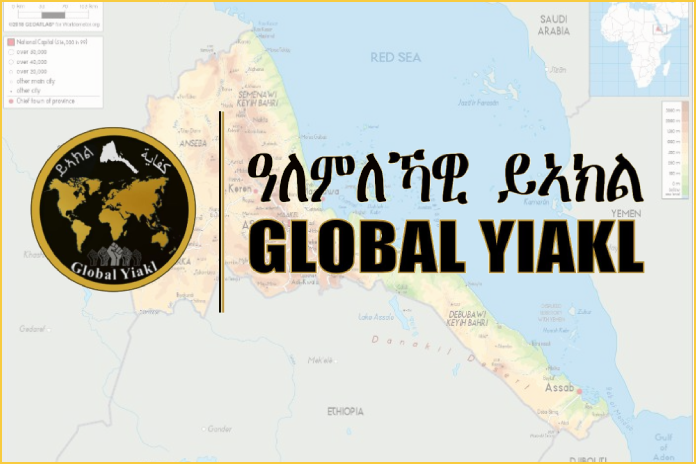Date: September 8, 2025
To:
H.E. António Guterres, Secretary-General, The United Nations
H.E. Mahmoud Ali Yousouf, Chairperson, The African Union Commission
H.E. Ursula von der Leyen, President, The European Commission
H.E. Ahmed Aboul Gheit, Secretary-General, The Arab League
H.E. Ismaïl Omar Guelleh, Chairperson, Intergovernmental Authority on Development (IGAD)
RE: Urgent Warning of Imminent War in the Horn of Africa Fueled by Ethiopian Claims on Eritrean Territory and Preparations for Forceful Acquisition
Your Excellencies,
Global Yiakl Eritrean Movement, representing Eritreans worldwide, dedicated to justice, democracy, and human rights, writes to you with grave urgency to sound the alarm on the imminent threat of a catastrophic new war between Ethiopia and Eritrea. We implore the international community to take immediate and decisive action to prevent a conflict that would devastate the region and pose a serious threat to international norms and trade through the Red Sea.
For months, the Ethiopian government, led by Prime Minister Abiy Ahmed, has engaged in a dangerous and escalating campaign of threats against Eritrea’s sovereignty and territorial integrity. Central to this campaign is an explicit and aggressive claim to Eritrea’s Red Sea port of Assab. This rhetoric is not mere political posturing; it constitutes a flagrant violation of international law and a clear threat to regional peace.
Prime Minister Abiy has publicly described Ethiopia’s internationally recognized border with Eritrea as a “historical mistake” that “will be corrected.” He has declared access to the Red Sea a matter of national “survival” and stated it is “only a matter of time” before Ethiopia regains access to Assab. This belligerent language is being amplified by Ethiopian state media, which is disseminating nationalist propaganda and disinformation—including doctored maps—to stoke public sentiment for war. These actions directly contravene the foundational principles of both the United Nations Charter and the African Union Constitutive Act, which unequivocally uphold the sovereignty and territorial integrity of member states.
The border between Eritrea and Ethiopia is not subject to debate. Eritrean borders, like those of all other formerly colonized African countries, are defined by the boundaries that existed during the Italian colonial period. The border conflict that arose around the Eritrea-Tigray boundary was definitively and finally settled through a “final and binding” arbitration agreement between the two governments. Ethiopia’s current claim is an attempt to unilaterally dismantle this internationally recognized border. Ethiopian troop mobilization near the Eritrean border confirms that these threats are not empty. War between the two countries now appears imminent.
While Ethiopia’s predatory aggression is the primary driver of this crisis, the situation is tragically compounded by the oppressive nature of Eritrea’s own regime. President Isaias Afwerki’s government cynically exploits the Ethiopian threat to deepen its authoritarian grip on the Eritrean people. The looming war serves as a convenient pretext for the regime to justify the ongoing suspension of the constitution ratified in 1997, thereby denying the Eritrean people their fundamental human and democratic rights. The external threat is used as a tool to maintain the country on a permanent war footing, perpetuate the abusive system of indefinite national service—which the United Nations has characterized as a form of enslavement—and crush any calls for democratic reform. The Eritrean people are trapped between an existential external threat and an internal oppressor who profits from the perpetuation of the “no war, no peace” status quo, which this new crisis threatens to worsen.
Both Eritrea and Ethiopia have endured decades of internal and external wars. A new conflict would be an unmitigated disaster for the peoples of both nations, who are still reeling from displacement, economic hardship, and trauma. It would trigger a massive humanitarian crisis, further destabilize the Horn of Africa, and create a security vacuum exploitable by extremist groups. Additionally, geopolitical maneuvering by regional and international actors risks inflaming this volatile tinderbox.
We, therefore, urgently call upon the United Nations, the African Union, the European Union, the Arab League, Intergovernmental Authority on Development and all influential countries concerned with peace and stability in the Horn of Africa-Red Sea region to:
- Publicly Condemn Ethiopia’s Rhetoric: Unequivocally denounce the Ethiopian government’s predatory claims on Eritrean territory and threats to acquire it by force as violations of international law and threats to international peace;
- Demand Adherence to International Law: Reaffirm the “final and binding” nature of the Ethiopia-Eritrea Boundary Commission (EEBC) decision, recognizing the border it defines as the official border between the two countries;
- Call for Immediate De-escalation: Insist on the immediate cessation of military posturing and the withdrawal of troops from border regions to reduce the risk of accidental conflict;
- Initiate Urgent Diplomatic Intervention: Launch a high-level, concerted diplomatic effort to mediate between the two countries, making it clear that any attempt to alter borders by force is unacceptable and will be met with serious consequences. Normal maritime access for Ethiopia through the Eritrean port of Assab, consistent with international norms and agreements, could be one aspect of negotiation;
- Press for Internal Reform in Eritrea: While addressing the external threat, exert pressure on the Eritrean government to end repressive policies, implement its constitution, and respect the human rights of its citizens, who deserve to live in freedom and security.
The time for preventive diplomacy is now. Waiting for the first shot to be fired would be a catastrophic failure of international responsibility. We trust that you will give this grave matter the immediate attention it deserves.
Respectfully,
Global Yiakl Eritrean Movement



